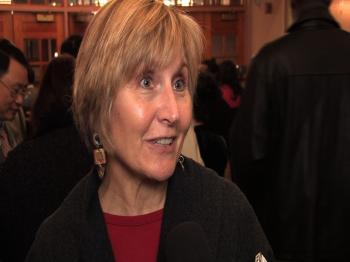Misleading food advertisements on television could be adding to Australia’s obesity problem, industry experts say.
The NSW Centre for Overweight and Obesity released a report recently saying that more than half the television commercials in Sydney promoting food were misleading.
The centre said many advertisements were promoting food for its nutritional benefits while not mentioning its high sugar or fat content.
Dr Paul Magnus from the Australian Institute of Health and Welfare said Australia’s obesity problem was the result of more than just television commercials.
Australia is in the worst third of OECD countries for body weight, with more than half the population too heavy, either overweight or obese, he said.
“There’s no doubt that we are a very heavy nation. We might well be a contender for the Olympic finals when it comes to body weight,” Dr Magnus said.
He said Australia’s obesity problem is a reflection of lifestyle, over-compensation after years of seeking to be free from hunger and toil.
“We have succeeded in spades, so we have sort of overshot the mark. We have food at hand all the time in our face. When we add those things together, you get a fat society.”
Dr Magnus said because of all the automatic devices in our daily lives, we have managed to cushion ourselves from moving.
“We need to be able to measure precisely not only how overweight we are, but also how much energy we are taking in from our food and how much physical exercise we are getting,” he said.
“I think it is something we will eventually get on top of one way or another. It is just another health challenge; it’s a very significant one and we will get on top of it.”
Australian Competition and Consumer Commission chairman Graeme Samuel said organisations promoting nutritional benefits that don’t exist can be prosecuted under the Trade Practices Act.
He said that at the moment, there are no penalties for misleading and deceptive advertising unless it is so fraudulent the commission decides to take criminal action.
The penalty for misleading advertising in criminal cases could cost organisations more than $1 million, he said.
Legislation would be revised later this year. Mr Samuel said the Minister for Competition Policy and Consumer Affairs, Chris Bowen, has discussed introducing civil penalties, following a recommendation from the Productivity Commission.
Sydney nutritionist Kathy Chapman from Cancer Council NSW said that it would be a public health concern if advertisers were directing food marketing at children.
“There is a consistent body of evidence that food marketing affects children’s preferences, purchase requests and the food they eat.
“As the majority of food marketed to children is high in fat, sugar and salt, this is going to affect children’s nutrition intakes and health,” Ms Chapman said.
Studies have shown that more effective regulations on food marketing to children would be a cost-effective strategy to address childhood obesity in Australia, she said.
“We need to see the Government introduce stronger regulations to limit food marketing to children across all forms of media, including TV, Internet, children’s magazines.”
Ms Chapman suggested barring unhealthy food advertising on TV before 9pm.
“Some countries – Norway, Sweden and Quebec in Canada – have bans on all types of marketing directed at children, including for food and beverages.”
The UK last year introduced some restrictions on TV advertising of foods that are high in fat, sugar and salt during programmes targeting children, she said.
More than half the males and almost 40 per cent of females in NSW were overweight based on self-report from the NSW Health Survey in 2002.





